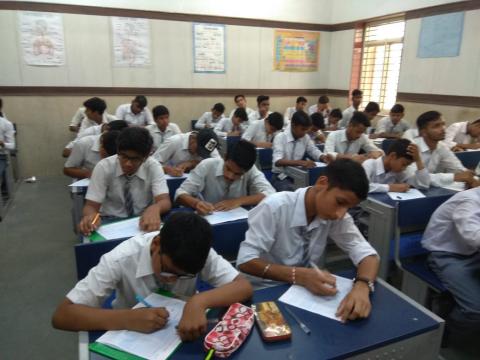
Rethinking Education: Challenging the Role of Examinations in Learning
February is a month of irony. On one hand, the warmth of the sun opens up possibilities for new dreams and aspirations, while on the other hand, the stress of exams relegates minds to examination-related stress. With 280 million children in school, if we also consider their parents and teachers, we can safely say that almost half the population of the country experiences these ironies in February. The draconian examination system is deeply rooted in our education system, taken as if it is given. This post aims to remind us once again that the examination system is not given; it is one that we have created, and it is we who have the capacity to dismantle it.
Seeing examination performance as the marker of learning is one of the most flawed concepts in education. I recently had a conversation with a school principal who gently disagreed with my idea and stated that exams force children to study, or at least fear of exams does, thus facilitating their learning. She went a step further and labeled my idea, "Examination cannot be seen as the marker of children’s learning," as bookish. I gently smiled and empathized with her situation, where she bears the responsibility to ensure that children learn, and fear seems to be the most efficient means to ensure it.
What's the problem with this fear-induced learning?
We tend to avoid anything associated with fear whenever we have a choice. Learning, which should be lifelong and ever-flowing like a river, halts the moment examinations disappear from our lives. This is one reason why millions of 'educated' people stop reading and actively participating in learning opportunities, clinging to obsolete ideas in a fast-changing world. Here, examination's role in learning is like a push factor, where a force propels a cart, but once the force is withdrawn, the cart stops moving. In contrast, learning as a natural phenomenon is a lifelong endeavor, sparked by curiosity, discovery, and critical thinking, acting like an engine pulling the cart. The fuel for this engine is curiosity, discovery, and innovativeness, akin to green and sustainable fuel, allowing the cart to move through life with a self-sustaining engine.
Examination-related learning is extremely parochial in its approach, stifling natural curiosity and focusing on content dictated by the examination system, controlling what we should learn and what we shouldn't. This control by authority deprives learners of the opportunity to grow as emancipated human beings, molding them into predefined paths where deviation is deemed failure. This provides a mechanism for the state to control its citizens.
Examinations cannot capture the multiplicities of learning that a child demonstrates. Despite recognizing this limitation, the examination system declares learners as failures, showcasing the power dynamics that favor the powerful. In this system, examiners hold power over examinees, and it is the examinee who always fails, not the examiners. Despite acknowledging that we all learn differently and have different capacities, the examination system turns a blind eye and continues with a seemingly given system, convenient for market forces to profit from.
Is there an alternative?
Most of us have used GPS navigation devices, which have an interesting feature: whenever we deviate from the suggested path, it redirects and shows a new route, never declaring us as wrong or failed drivers. Assessment is necessary, but only to facilitate learning, not to label someone as pass or fail. Little children in grade 5 and above are appearing for terminal exams this year, which will determine whether they progress to the next grade. In many cases, failing these exams could mean discontinuation from schooling, and for girls, it could lead to forced early marriages, as patriarchal societies often allow girls to study only if they perform academically. After 75 years of independence, if our system still forces early marriages for girls or discontinuation of schooling for children, it's we who have failed, not the children.
- Log in to post comments
